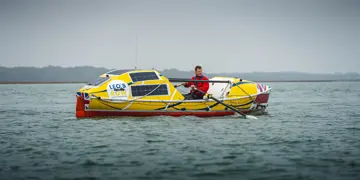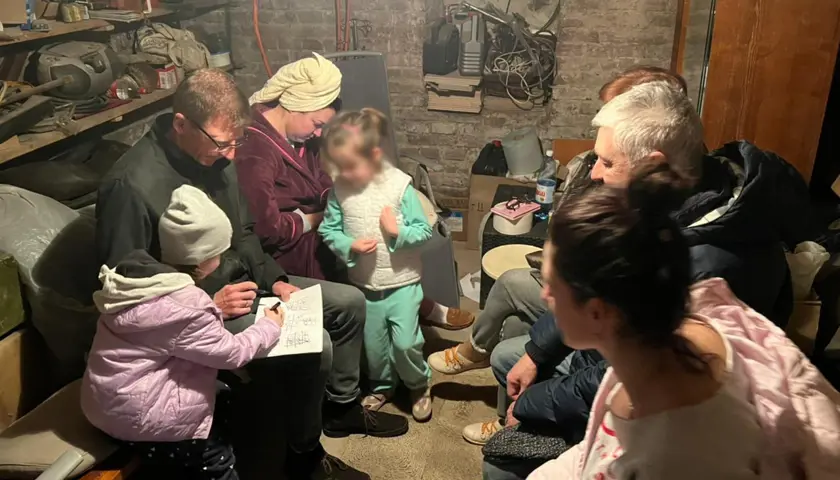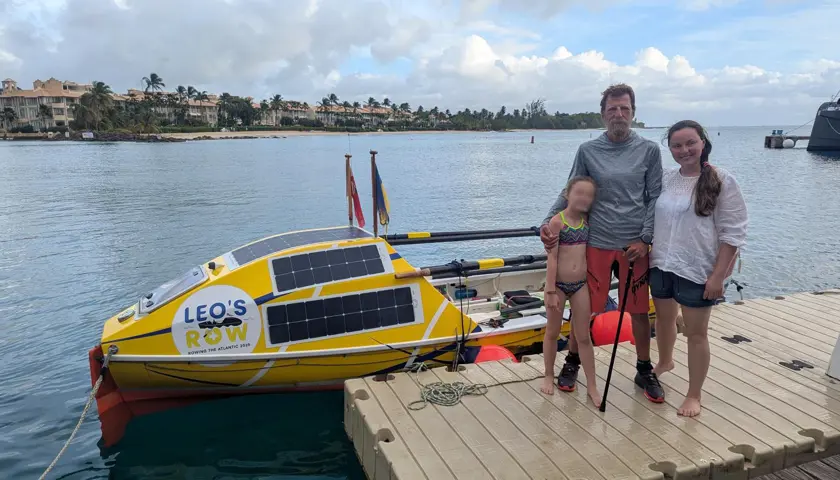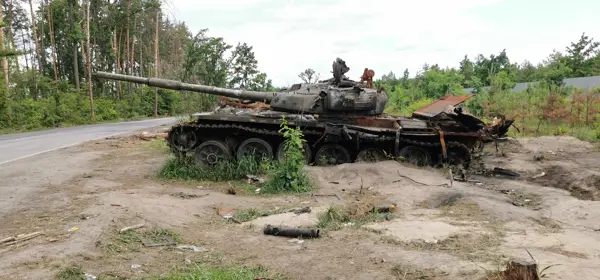Rowing for Ukraine – a doctor's solo voyage across the Atlantic
Rowing for Ukraine – a doctor's solo voyage across the Atlantic
Leo Krivskiy was already supporting doctors in Ukraine, but Russia's second invasion led him to an extraordinary 3,300-mile challenge to raise money for vital medical supplies. Seren Boyd reports
It is hard to fathom why you might set out to row the Atlantic, solo and unsupported, with only towering waves, endless horizons and your own restless thoughts for company.
Leo Krivskiy (pictured above) was not an experienced mariner. He is mostly a consultant anaesthetist in southern England but he was intent on becoming one of the few people ever to cross the Atlantic the hard way – in a ‘pure class’ boat. He made it to Barbados, after more than 3,300 miles and 96 days – but he very nearly didn’t.
Quite why he wanted to push himself to the limits of human endurance is the thread running through our conversation in Salisbury, soon after his return to the UK.
What is certain is Dr Krivskiy wanted to raise funds for doctors serving on the frontline of the war in Ukraine where he has many friends. ‘I wanted to see if I was strong enough mentally,’ he says. ‘And I wanted to see who I really was, not the roles I play in my daily life.’
What is harder to unpick is how the first 31 years of his life in Russia play into this and what exactly he wanted to prove to himself.
As he says, tantalisingly, ‘it’s not about fighting an ocean; it’s you against you, fighting your inner demons’.
Internal struggle
The decision to row solo and unsupported had been inspired partly by two ‘warm-up’ challenges that hadn’t gone to plan: a race in the Mediterranean with a poorly organised team and an Atlantic attempt aborted in training when it became clear the skipper was an alcoholic.
What clinched it for Dr Krivskiy was meeting Tom McClean, an SAS soldier who rowed solo from Newfoundland to Ireland in 1969, in a simple skiff. He had also met ocean-rower and ex-Marine Dave ‘Dinger’ Bell, who would become his coach. And he had spoken with Ian Rivers, a former SAS soldier who rowed the Atlantic using only a sextant – in memory of escaping his ISIS captors in Syria and navigating the desert by the stars.
Dr Krivskiy spent a year preparing, building up his physical strength, working on his boat, rowing in the Solent and completing his Yachtmaster Ocean theory exam. Yet, the night before he set sail from Gran Canaria, he admitted to Dinger, he didn’t feel ready. ‘You’ll figure it out,’ came the reply.
It soon became obvious that his boat, Happy Socks, was not fully prepared either, despite her impressive ocean-rowing form under four previous owners.
It's not about fighting an ocean; it's you against you
Leo Krivskiy
Severe conditions in week three disconnected the rudder, damaging her steering irreparably. After bodges with cable ties, which required him to hang precariously from his back hatch, Dr Krivskiy tied steering lines to cleats by the oars, a fix that saw him through to Barbados.
However, it was less than ideal. With poor weather and strong currents, progress was much slower than the 60 days he had planned for. His top speed was two knots or 2.3 miles per hour. For a total of eight days, cross-swells or tropical lows were so strong he had to drop anchor.
Flooding destroyed the snack rations in his cabin and rotting biltong gave him food poisoning. His cabin and mattress were mouldy for two-thirds of the row. He nearly quit, twice.
Unsurprisingly, his mental health suffered. He had Dinger and weather router Simon Rowell for technical support back in the UK, audiobooks for escapism and daily satphone chats with his family. Experienced sailor Darren Saunders was on hand for moral support – and on standby to tell Dr Krivskiy’s family if he didn’t make it.
Otherwise, he was alone in a six-metre piece of fibreglass in Ukrainian colours, a bucket for a toilet, facing a daily onslaught of three-metre waves which sometimes grew to 10.
For the first month, he had to force himself to leave the cabin and start his 12- to 14-hour rowing sessions. He cried sometimes, generally at the beauty of the ocean, three times in despair.
BLOWN ABOUT: Dr Krivskiy faces up to a 'squall' – a sudden, sharp increase in wind speed
‘I treated each day separately; I wasn’t looking ahead. Some days, I cried and rowed. But you just deal with it. I was scared of things that never happened.’
The hardest part was the third month. ‘I started feeling that I’d become this sea monster, that the ocean would not let me go, that it would never end. I couldn’t imagine normality: it was very, very far.
‘In the last three weeks, it was just dark. I just made myself row. “Chop wood, carry water”, that was my mantra.’
Bandages and bulletproof vests
Perhaps part of the reason Dr Krivskiy chose to do it the hard way is because he was doing it for Ukraine. He has had strong emotional links with the country since childhood; his mother was Ukrainian and he spent most summers in his grandmother’s village outside Kyiv. The connection grew stronger when he met Valeria, his Ukrainian wife.
In 2014, when Russia annexed the Crimea, he started supporting doctors in Ukraine with online and in-person teaching on topics such as major blood loss, as well as his specialist subjects, vascular and thoracic anaesthesia.
‘I had to feel that I was helping. I just channelled my anger and frustration into something practical.’
He also began delivering equipment and supplies in person, most of which he funded. However, when Russian troops invaded Ukraine for a second time in 2022, he decided to step up his efforts and set up a charity, Ukrops.
As well as signifying Ukrainian Medical Operations, the name ‘Ukrops’ is ironic. It’s a derogatory term Russians use for Ukrainians (meaning ‘dill’, the herb) and one that Ukrainians have adopted for themselves.
An email to his colleagues at University Hospital Southampton raised £30,000 in a fortnight for emergency response essentials such as tourniquets, Israeli bandages and Celox gauze. Some medical workers who had been conscripted also requested bulletproof vests and ballistic helmets.
Throughout the years Dr Krivskiy has made several visits to Ukraine, delivering training, equipment, even flu vaccinations, and negotiating awkward conversations at checkpoints about why his passport says his place of birth is Moscow.
On his personal website, he has shared the stories of many Ukrainian colleagues he has befriended or supported through the years, keen to bear witness to their struggles and courage.
Keep standing, like Rocky. That’s all you can do till your enemy sees that you’re indestructible
Leo Krivskiy
The pressure on civilian doctors facing an onslaught of appalling blast injuries is intense. ‘In the common room, there’ll be a box of antipsychotic drugs and antidepressants,’ says Dr Krivskiy, ‘and they learn how to use them in a crisis, taking a tablet or two when they need it.’
‘Leo’s Row’ has raised more than £54,000 and he has had many moving messages of thanks from Ukrainian colleagues on his Instagram blog.
‘Three months of rowing is not three years of war but they write to me that it is an inspiration for them, how I talk about taking one day at a time. [Theirs] is a battle you can’t win but you can keep standing, like Rocky. That’s all you can do till your enemy sees that you’re indestructible.’
Predictably, people try to make sense of his story by focusing on his Russian roots. It is clear he wants to distance himself from his past.
‘It is a work [in progress] because I still remember being a part of that evil,’ he says.
‘I cross the street when I hear the Russian language. I never approach Russians unless I know they’re OK. I don’t want to have anything to do with them. I’m afraid to be disappointed.’
The irony that we meet in Salisbury – where Sergei and Yulia Skripal were poisoned by Russian intelligence agents – is not lost on him.
His early years in Moscow brought a growing recognition of the stultifying effect of the Soviet system which ‘turned people into zombies’. He talks fondly of people who rebelled – especially the progressive, western-leaning doctor who founded the anaesthetics department where he trained. The granddaughter of Stalin’s cardiologist, she urged her trainees to go abroad when Putin came to power in 2000. Most, like Dr Krivskiy, did.
His last visit to Moscow was in 2014, to provide palliative care for his mother as she was dying of untreated breast cancer – a Putin faithful to the last though the Russian health system had failed her completely.
‘If the surgeons can’t make money out of you, no one’s interested. I experienced all the awfulness of the system at the same time my mother is believing this propaganda. It was extremely painful.’
A heavy toll
Of one thing Dr Krivskiy is sure: he wants to stand on the right side of history, pursuing change where it’s needed, rather than accepting the status quo.
He recalls his first time in a bomb shelter, on his first visit to Lviv in May 2022 – the incongruity of children playing and the contrast in parents’ responses.
‘Some parents were clearly giving up without a fight: completely withdrawn, like children, scrolling their phones. And some were involved in protecting their families and trying to be a centre of calmness, spreading calm.’
This was a powerful life lesson: ‘If there’s a wall, you just have to somehow go through the cracks.’
Dr Krivskiy’s row and the decision to live life so intensely has taken its toll.
Looking back at footage of himself when he is greeted by the harbour master and a burger in Barbados, he recognises a ‘1,000-yard stare’. He is surprised he recovered. He hopes one day his daughters will understand why he left them for three months.
He also remortgaged the house to cover the costs of the crossing, more than £100,000. But he doesn’t regret it. ‘Better than spending it on a Ferrari.’
Then, Dr Krivskiy pauses and admits he’s already looking for the next ‘project’.
‘I need something to push me, though maybe not as big as this one. It’s tested me in so many ways. I have to live my life differently now. I can’t really betray that.’
And, it seems, he is still wrestling with those demons. ‘I have chronic wanderlust. I never settle – I’m always trying to escape.’
(Image credits: Jamie Barnes and Leo Krivskiy)





